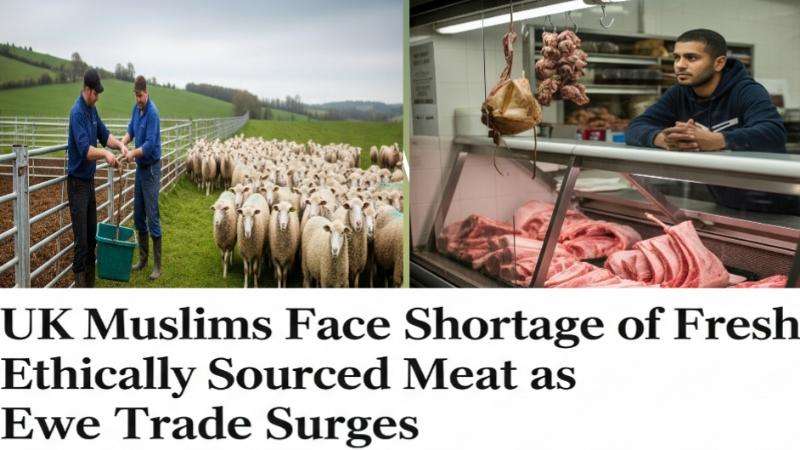A growing crisis is unfolding within the UK's halal meat market, with Muslim consumers facing an increasingly dire shortage of fresh, locally sourced, and ethically compliant meat, Daily Dazzling Dawn understands.
This critical situation is exacerbated by a significant recent surge in demand for adult sheep meat, particularly cast ewes, which are seeing consistently strong trade due to a notable decrease in overall supply. While this trend benefits some producers, it creates immense pressure on a halal supply chain already struggling to meet the community's needs.
From an Islamic perspective, the consumption of halal meat is a fundamental aspect of faith, requiring animals to be slaughtered according to specific, compassionate guidelines (dhabihah). This involves a swift, clean cut to the animal's throat by a Muslim, ensuring the complete draining of blood, and often accompanied by a prayer invoking Allah's name. The emphasis is not only on the method but also on the animal's welfare prior to slaughter – a principle often overlooked in large-scale, industrial meat production.
The current escalation in demand for adult sheep meat, especially cast ewes (older female sheep no longer breeding), is a complex issue. Farmers are finding a lucrative market for these animals, driven by their suitability for various cuts and a generally lower fat content compared to younger lambs. However, this increased demand is colliding with a reduced overall supply of sheep in the UK, a consequence of various factors including rising input costs for farmers, changes in agricultural policies, and potential shifts in farming practices away from sheep production.
For the UK's estimated 3.9 million Muslims, according to the 2021 census, the impact is profound. Many prefer fresh, unpackaged meat, allowing them to verify its origin and the integrity of the halal process. The scarcity means that consumers are often left with limited choices, sometimes resorting to frozen or pre-packaged options from larger distributors, where the journey from farm to plate is less transparent. There's a deep-seated concern within the community about the authenticity and ethical sourcing of such meat. Stories of mislabeled products or animals slaughtered under conditions that do not fully adhere to Islamic principles continue to circulate, eroding trust in the broader halal market.
The crisis highlights a significant disconnect between the growing Muslim population and the capacity of the UK's domestic meat industry to provide adequate halal options. While some abattoirs and suppliers are dedicated to halal practices, they often struggle with the volume and consistency required to meet market demand, particularly for fresh meat. The reliance on imported halal meat further complicates matters, raising questions about sustainability, carbon footprint, and the precise adherence to halal standards in countries with different regulatory environments.
Community leaders and halal certification bodies are calling for greater investment in and support for local halal meat production, encouraging more farmers to engage in ethical sheep rearing and more abattoirs to adopt rigorous halal slaughter practices. Without a concerted effort to address both the supply constraints and the demand for transparent, fresh halal meat, the UK's Muslim community will continue to face challenges in fulfilling a fundamental religious observance with confidence and peace of mind.
The rising price of ewe meat, while a boon for some in the agricultural sector, is yet another indicator of the underlying structural issues in a market that desperately needs reform to serve its growing, diverse consumer base.
British Bangladeshi, British Pakistani, and broader British South Asian BAME Muslims are deeply concerned about the authenticity and ethical sourcing of halal meat and chicken, a matter intrinsically linked to their faith and cultural identity.

_4.jpg)


 and Dawn Wicks.jpeg)



.svg)
